Editor’s note: Jim Hummel has a quarterly update with new information on a handful of his investigations.
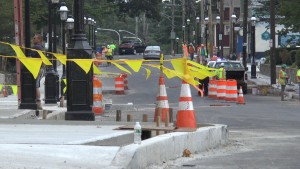 Into The Homestretch — The Rhode Island Department of Transportation is putting the finishing touches on the much-anticipated and often-maligned Apponaug Circulator Project. The official completion date is Nov 30, when state officials hope the project, as envisioned years ago, will come to fruition and make traffic smoother.
Into The Homestretch — The Rhode Island Department of Transportation is putting the finishing touches on the much-anticipated and often-maligned Apponaug Circulator Project. The official completion date is Nov 30, when state officials hope the project, as envisioned years ago, will come to fruition and make traffic smoother.
Our investigation last spring showed there were more than 100 accidents at the five intersections in the six months since initial sections of the project were opened — four at the time with rotaries — primarily fender-benders caused by people confused about how to negotiate the traffic circles and who yields to whom.
The summer brought more headaches than relief as traffic was often backed up while crews continued to work. Viewers sent us pictures of the accidents, the plethora of orange barrels and ponding after heavy rains.
The DOT tells The Hummel Report the project is on time and on budget — the revised budget of $71 million, not the $30 million project initially presented to the taxpayers.
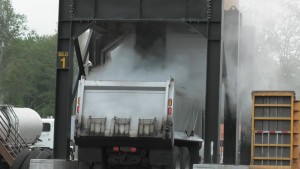 Up and Running — We first told you four years ago about a controversial asphalt plant right in the middle of Coventry and the owner’s pledge at the time to move out of that location. Last winter that pledge turned into a reality, and last month we went to see how he was doing at his new location at Quonset.
Up and Running — We first told you four years ago about a controversial asphalt plant right in the middle of Coventry and the owner’s pledge at the time to move out of that location. Last winter that pledge turned into a reality, and last month we went to see how he was doing at his new location at Quonset.
Owner Tom Miozzi directed the move himself, part of it during the early stages of a snowstorm last winter. He moved his plant, piece by piece, 12 miles down the back roads to its new home: a parcel double the size in Quonset, where there are no residential neighbors as there were in Coventry.
Miozzi tells us he is doing 11% more business than he did this time last year and expects to produce more than 140 tons of asphalt by the end of the season later this year, a record for his company.
Because there are no time restrictions on hours of operations, he says his trucks have been able to leave at 5am rather than 7am, opening up new business opportunities in neighboring Connecticut and Massachusetts.
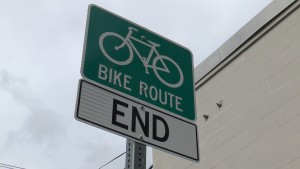 On The Beaten Path — Last year we reported on a plan aimed at making it easier to get to the Seekonk River on the East Side of Providence. Part of those plans included a bike path. And in August, they completed it.
On The Beaten Path — Last year we reported on a plan aimed at making it easier to get to the Seekonk River on the East Side of Providence. Part of those plans included a bike path. And in August, they completed it.
It is officially called Segment 1A of the Blackstone Valley Bikeway, but the locals will likely call it the Gano Street section of a path that will eventually stretch north to the Massachusetts state line Woonsocket and south to Bristol. The ¾-mile path starts at the base of the Gano Street exit off Route 195 and runs along the Seekonk River to Pitman Street, with the easiest access at the Trenton Street boat ramp. The $2.5 million project was 100% federally funded. The DOT completed the project in 12 months, on time and on budget.
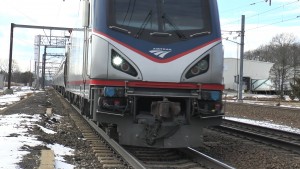 Not In Our Backyard — Opponents of a proposed Amtrak rail line that would run through some prime sections of Charlestown got good news in July when the feds announced they had a change of heart and were not going to build the bypass after all.
Not In Our Backyard — Opponents of a proposed Amtrak rail line that would run through some prime sections of Charlestown got good news in July when the feds announced they had a change of heart and were not going to build the bypass after all.
The proposed bypass was part of a long-range plan by Amtrak to try and shorten the train route that runs The Northeast Corridor from Washington, DC to Boston. The proposal called for a jog north of Old Saybrook and East Lyme that eventually would chew through farm and conservation land like this in Charlestown.
Local leaders in both Connecticut and Rhode Island mounted strong opposition, arguing that the bypass wouldn’t save any time. The Federal Rail Administration made no comment, simply releasing a revised plan in July without the proposed bypass included.
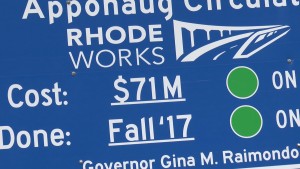 A Big Scoop — Finally, if you’re a customer of the Narragansett Bay Commission, you already have seen your rates triple over the past decade. Now the commission is facing a $5 million grab out of its reserve fund by the General Assembly, trying to plug its own hole in the budget.
A Big Scoop — Finally, if you’re a customer of the Narragansett Bay Commission, you already have seen your rates triple over the past decade. Now the commission is facing a $5 million grab out of its reserve fund by the General Assembly, trying to plug its own hole in the budget.
Facing a more than $100 million budget deficit, the General Assembly last spring raided the reserve funds of several quasi-public agencies like the Narragansett Bay Commission. Ratepayers have gotten sticker shock as they’ve footed the bill for millions of dollars of improvements to the water quality of the bay, resulting in the cleanest water in more than a century.
A Commission spokeswoman tells us the NBC will likely use some restricted funds and does not anticipate having to raise rates to cover the $5 million legislative scoop. But it first needs permission from the state Public Utilities Commission to transfer the funds.
The Hummel Report is a 501 3C non-profit organization that relies, in part, on your donations. If you have a story idea or want make a donation, go to HummelReport.org, where you can also see the video version of this story. You can mail Jim directly at Jim@HummelReport.org